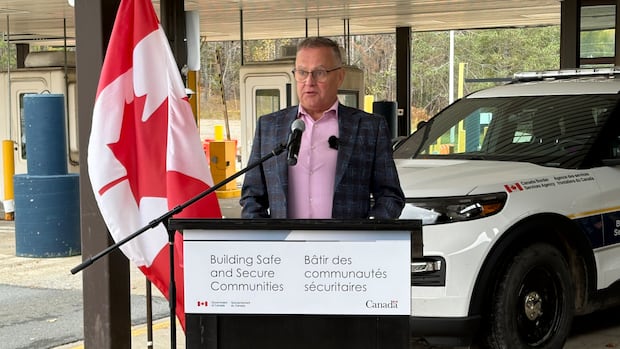New BrunswickSaint John-Kennebecasis MP Wayne Long announced $617 million in federal funding for border security and the hiring of 1,000 new border officers.Allocation of new officers hasn’t been determined, will be based on needOliver Pearson · CBC News · Posted: Oct 17, 2025 4:37 PM EDT | Last Updated: 3 hours agoN.B. MP Wayne Long announced funding for the federal government’s border security plan. The money will help with border officer recruitment. (Ian Curran/CBC)The federal government has announced a boost to border security that is set to have an impact in New Brunswick.Wayne Long, MP for Saint John-Kennebecasis, made the announcement at the Woodstock-Houlton border on Friday.Starting in 2025-26, the government will spend $617 million over five years on their border plan. This is a part of the upcoming budget that will be tabled on Nov. 4.Long said the country’s safety and security begins at our borders and this funding is “of vital importance.”“Our world is different. We have more risks. We need to protect our border. We need to strengthen our country. We need to protect our sovereignty. So this has been long overdue,” said Long, who is the secretary of state for the Canada Revenue Agency and Financial Institutions.The funding will be used to hire 1,000 Canada Border Services Agency officers. Long said this adds to 10,000 existing border personnel.He said the funding amount is the “largest investment in our border in Canada’s history.”WATCH | Government funding will help, Woodstock border agent says:Canada to increase hiring for border jobs, do more on recruitmentThe federal government is investing $617 million in border security.It also includes new measures to improve recruitment.The stipend paid to CBSA recruits during training will increase from $125 per week to $525 per week, an amount that hasn’t changed since 2005.The Public Service Superannuation Act will be amended to give workers retirement options after 25 years of service, regardless of age. This also applies to parliamentary protection officers, search and rescue personnel, federal and territorial firefighters, paramedics and correctional officers.The announcement, according to Long, is part of a broader border plan to “keep communities safe by keeping drugs, guns and criminals off our streets.” He said, “Canada’s new government is targeting drugs, cross-border crime and illegal migration to save lives and keep Canadians safe.”Long said the plan will also address concerns from the U.S. regarding drug trafficking and fentanyl.Part of the reason for the federal government’s border security plan is to address concerns from the U.S. about the flow of drugs south. More staff means more searches, according to the Woodstock point of entry Superintendent Sylvie Cormier. (Chad Ingraham/CBC)He said the allocation of new officers for New Brunswick hasn’t been determined, but he said the Port of Saint John will get more support.“Obviously Port Saint John is growing exponentially. There’ll be more CBSA support and services there. And I mean, they’ll be allocated at the crossings in areas where they’re needed.”One border officer hopes there will be impacts at the Woodstock-Houlton border along the western edge of the province.“We have very much a need for more employees here to help us keep our communities and Canada safe,” said Syvlie Cormier, the superintendent at the Woodstock point of entry.”It very much helps when you have more employees. We’re able to do more searches and get more firearms, illegal drugs and to keep inadmissible people outside of the country.”Sylvie Cormier is the superintendent at the Woodstock point of entry. She said crossings have been down, but there is still a need for more border officers there. (Chad Ingraham/CBC)Cormier said traffic has been down at the land crossing over the past few months.“They are going back up a tiny little bit now that the [Canadian] tariffs are gone, but they have been significantly lower than what we are used to.”The number of U.S. residents entering the country by automobile is down across the board.According to Statistics Canada, in September, there were 1.1 million trips, which is a 5.3 per cent decrease from September last year. It’s also the eighth consecutive month of year-over-year declines.ABOUT THE AUTHOROliver Pearson is a reporter at CBC New Brunswick. He can be reached at oliver.pearson@cbc.caWith files from Ian Curran
Feds announce $617M for border security, officer recruitment some in N.B.











